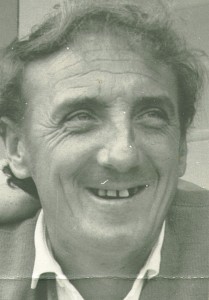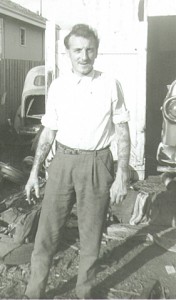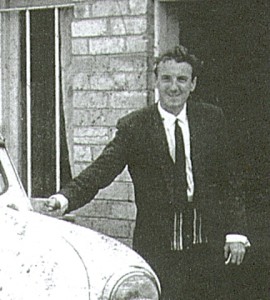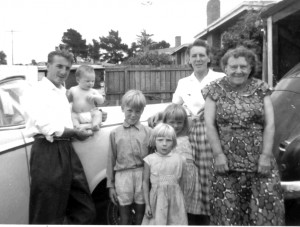Jackie Williams – a story of Identity Diffusion
 My father was diverse. He was a lover of art, kind, responsible, generous, romantic, nostalgic and loyal. He was inspiring, colorful, creative, funny, silly, wild, manic and grandiose. He was childish, self pitying, pouty. He was deranged, perverse, immoral, dangerous. He was compulsive, conscientious, resilient and competitive. He was a father and a madman, a child and a maniac, a workaholic and a fighter, a gambler and a binge drinker, and he was Bacchus.
My father was diverse. He was a lover of art, kind, responsible, generous, romantic, nostalgic and loyal. He was inspiring, colorful, creative, funny, silly, wild, manic and grandiose. He was childish, self pitying, pouty. He was deranged, perverse, immoral, dangerous. He was compulsive, conscientious, resilient and competitive. He was a father and a madman, a child and a maniac, a workaholic and a fighter, a gambler and a binge drinker, and he was Bacchus.
 He was a short man, only 5 ft 6, small build, heavy smoker, covered in tattoos, gaps in his teeth, broken nose, cheeky face and curly hair. He was a self taught mechanic, panel beater, spray painter, salesman, and he was a fence, an accessory, an enabler of all manner of criminals, and a criminal himself. He was on Valium and Tryptonol, uppers and downers, commonly prescribed for people with bipolar in those days. He was a closet dyslexic deeply aware and ashamed of being largely illiterate and struggled to write comprehensibly but did ultimately write me several lengthy letters.
He was a short man, only 5 ft 6, small build, heavy smoker, covered in tattoos, gaps in his teeth, broken nose, cheeky face and curly hair. He was a self taught mechanic, panel beater, spray painter, salesman, and he was a fence, an accessory, an enabler of all manner of criminals, and a criminal himself. He was on Valium and Tryptonol, uppers and downers, commonly prescribed for people with bipolar in those days. He was a closet dyslexic deeply aware and ashamed of being largely illiterate and struggled to write comprehensibly but did ultimately write me several lengthy letters.
He was a man of secrets, with a wife he had possibly never divorce, one who he may well have feigned having married, a mistress he kept around the corner, and a teenage prostitute he became attached to. He was a loyal son who looked after his homeless and elderly parents, a man who tried to maintain some semblance of a marriage to a woman he had outgrown, grossly mistreated, provided for, but ultimately had empathy for. He was idiosyncratic, a fool, a comic. He was a closet schizoid being the life of the party, surrounded by people but with no close friends. He was an opportunist, a survivor, an underdog torn between complete self indulgence and survivor guilt.
He was Jackie Paper my father, Sparkling Arkie the materialist show off, Wild Dog Dingo the rampaging maniac, Poor Boy the self pitying child, and Jackie Williams the car man and John Williams the respectable family man.
As a person diagnosed with Dissociative Identity Disorder (DID) I needed to journey to understand who my parents were because their chaos ultimately became my chaos, a chaos I’ve ultimately resolved. Facing my mother’s multiplicity, I asked myself if my father, too, fitted Dissociative Identity Disorder.
 His various selves were compartmentalised, but unlike my mother, each of these parts of him appeared to have no denial of the other parts of him. It was as though, for him, it was completely normal to be so many conflicting people. He not only had no denial of the different parts of him (unlike my mother) but was capable of discussing feelings about who he’d been as each of these people… where he felt guilt, shame, remorse, pride, lack of control, self indulgence.
His various selves were compartmentalised, but unlike my mother, each of these parts of him appeared to have no denial of the other parts of him. It was as though, for him, it was completely normal to be so many conflicting people. He not only had no denial of the different parts of him (unlike my mother) but was capable of discussing feelings about who he’d been as each of these people… where he felt guilt, shame, remorse, pride, lack of control, self indulgence.
 My conclusion was that he fitted a thing called identity diffusion… a normal phase of development in one’s teens… only he failed to emerge out the other side. He remained all of these things. And with a mother who I feel fitted Dissociative Identity Disorder, living with a partner with Identity Diffusion would have made her feel more ‘normal’. But similar is not same. One is developmentally delayed, even developmentally derailed. The other is also developmentally derailed, seriously mentally ill.
My conclusion was that he fitted a thing called identity diffusion… a normal phase of development in one’s teens… only he failed to emerge out the other side. He remained all of these things. And with a mother who I feel fitted Dissociative Identity Disorder, living with a partner with Identity Diffusion would have made her feel more ‘normal’. But similar is not same. One is developmentally delayed, even developmentally derailed. The other is also developmentally derailed, seriously mentally ill.
JACK’S TIME LINE
1936, Jack was born in Horsham, the sixth child to a series of half siblings. His father, Harry was a WW1 veteran who returned from the war, found his wife had new children, cut himself off from all family, assumed an alias and became a swaggie from 1920-36. In 1935-36 he took up with Jack’s mother, Ruby. The Great Depression was from 1929-1932 but for most people in Australia lasted until 1939 and as a returned soldier with no assets who had broken family ties the new family would have been living in poverty. Harry was serious, responsible, conscientious, solitary, private, moral and firmly religious. Ruby was developmentally different, descended from double cousin marriages, had 6 children all to different fathers and today would probably have been diagnosed somewhere on the autism spectrum. Ruby also brought to the partnership her 10 year old son.
1939, when war broke out Jack, aged 3, his older brother, aged around 10, his mother Ruby and father Harry lived in a forest in the hollow of a tree during The Depression. According to Jack’s brother, Jack’s father would cycle or walk 17 km to seek woodcutting work and the boss would either pay the workers or not. Ruby was musical, sang, played the spoons, harmonica, squeeze box. Harry was instructional and would have taught the children skills. As an adult Jack had a lot of awareness of bushcraft which probably came from this time and was quite at ease with living in the bush with the bare minimum of facilities, catching fish and rabbits and cooking outdoors on the ground.
1945, aged 6, at the end of WW2, Jack, together with his brother, his mother and father moved from the bush to the inner city and lived in slum housing in Fitzroy and Collingwood. From an early age Jack recalled mixed feelings about his mother.
Ruby drank Sherry and was a ‘dipso’ who loved to sing, dance, be jolly and socially indiscriminate in an intoxicated state. Jack loved his mother, cared about her but found she continually would forget her children so did not find her to be a reliable or functional mother.
He also witnessing his father’s treatment of her and experienced his own status effected by hers. He told how it was usual for his father to make him and his mother walk a distance behind him when in public. He told that for 10 months his father relegated his mother to sleep outside in the back yard under a tarpaulin.
I presume this was because he morally and socially could not cope with her behaviour in the community, its reflection upon him, its clash with his values, and yet he did not brutalise her, nor did her cast her out into homelessness in the street.
Similarly, he would openly voice his doubts that Jack was probably not his child, and, hence, Harry would have treated Jack at arm’s length accordingly. Jack also told of his father chopping down the stairs of their terrace house home and throwing a wardrobe over a balcony when he was outraged.
Jack also told of his father washing his mouth out with builder’s soap and scrubbing him with a heavy floor scrubbing brush until his skin was raw. So its fair to say that Jack’s father could be self righteous, authoritarian and like many WW1 veterans volatile, reactive, and unpredictable.
1943-44 Aged 7-8, Jack was a ‘character’ but mildly shy child who struggled with school, fitting what today might have been diagnosed ADHD. He told of climbing out the window and escaping down the drainpipe when the teacher wasn’t looking and appeared to revel in these antics. It painted him as someone happier not complying with authority, enjoyed making other kids laugh and being the class clown. He also told of escaping bullies by taking refuge up a tree, was knocked out of the tree by children throwing rocks, landed on his face and badly broke his nose, changing his looks for the rest of his life.
By his late childhood, local children (who in those days played in the street and formed groups) would mock and taunt Jack’s mother and taunt Jack about his mother, compelling Jack to choose a side. He told me with deep shame and regret of a time his mother was drunk on the pavement and local children were physically abusing her. Torn between defending her as a loving son, or saving himself as ‘one of the gang’, Jack pitched in with the local children, attacking the mother he loved, felt protective of, yet had become ashamed of, perhaps felt disappointed in that she could never rise to being an ‘acceptable mother’ in both functional and societal terms.
1953-54, Jack now a teenager, was in a football team, was an amateur boxer, but also belonged to a gang of peers who by adulthood would all have criminal records. He disclosed his remorse, self disgust and shame at his participation in an unsolved gang rape where he appeared to have again been witness to the abuse of a woman by his peers and once faced with having to choose a side, joined the abusers.
1957-1960 Around the age of 21 Jack married a woman named Valda. Valda was apparently from the bush town of Tarnagulla. She lived with Jack and his parents in Fitzroy-Collingwood and they had no children. Jack worked as a car cleaner. He told of having caught Valda sleeping with his best friend, attacked her and she left.
1960 My mother Marlene, now pregnant to Jack, moved in to take Valda’s place. My older brother, Shane, was born in mid 1961 and together with Ruby and Harry mother, Jack and Marlene and Shane moved into a rented house in Camberwell. I doubt he had much involvement with his son, my older brother. Jack’s father loaned Jack $50 with which he bought a car, resold it, bought two cars and from there began a second hand car yard which became his employment for over 25 years.
1962-63 According to my mother, whilst pregnant with me, Jack was out womanising and she caught him with a teenager. According to her his response to this was to threaten her with an axe. So I was born into this type of relationship. Jack, Marlene, Shane and Jack’s parents moved from Camberwell to Thornbury a week after I was born in October 1963. They lived in the terrace house in Thornbury until I was 6 months old. Then they moved to small dead end street in Regent where his parents lived in a shed in the back yard.
1964 Jack became responsible for keeping me safe. I was taken to a welfare program for at risk children Monday-Friday 9-5 from the age of 6 months to 2 and a half year old. I remember him as being like his mother, sunny, musical, engaging.
1966-67 when I was 2-4 Jack was taking me out in the car at night when he’d go collect money (and womanise with the women in the houses he was collecting from). I remember him as easy company and he was playful and would make sure I was warm in his coat on the back seat as he left me in the car in the dark for sometimes long periods of time. But as father’s go, I didn’t feel neglected at all. At the same time he got caught by my mother in the act of having sex with her sister which lead to her attempting to shoot him and her being sectioned under the mental health act. Their domestic violence was off my radar in those days but I’m sure it was already present and usual and that this and his womanising played a significant part in the significant worsening of my mother’s mental health challenges.
1968, when Jack was 32 years old, his father died and his mother Ruby moved 100 miles away to live in a caravan in his sister’s back yard in Drouin. This was the first time in his life that he didn’t live with his parents.
1969, when Jack was 33 years old, my mother’s sister Margaret had a son, Brett and my mother also had a son a few months later, Johnny. Though Margaret had taken a rented house two blocks from Jack’s work, Jack continued to be nothing more than ‘the uncle’ and never disclosed that Brett was his son until he disclosed this to me when I was 22 (by which time Brett was 16). Jack failed to form a relationship with Johnny and expressed doubt Johnny was his son, a repeat of his own father’s behaviour toward him.
1971, when Jack was 35 year old, Jack bought a house closer to his car yard with Margaret’s house midway between the two.
1971-1978 Fuelled by a regular flow of ‘dirty money’ soon filled the new house with a built in swimming pool, bar, snooker table, chandeliers, and began to throw weekend parties at the house where drunkeness and random sex became the norm. Margaret was a common guest at the parties as was a cop who was soon my mother’s boyfriend and who Jack regularly accused of being Johnny’s biological father. The parties commonly ended with extreme domestic violence, smashed glass, guns, knives, an axe sometimes came out, the emotional and psychological violence of both of my parents to each other would always pale in the context of his extreme physical violence toward her. This would regularly end with her having broken ribs, her false teeth smashed yet again, more bruises, her hair pulled out and her donning more wigs.
1973, my older brother, aged 12, was removed from school and went to work daily at Jack’s car yard. He was quickly indoctrinated not only into ‘business’ and ‘selling’ but into the sociopathic, criminal and misogynistic culture there.
1978-1980, I was 15 in 1978 when I left home for good. By this time Jack had a cabin cruiser, several convertible luxury cars, two businesses and a farm. Jack experienced social shame at my leaving and took around 2 years before he began to visit me.
1982-1984. My older brother had got engaged and left home to live with his fiance. Jack’s house had been sold and he became essentially homeless, sleeping on the sofa of a rented house my mother had taken on for her and my younger brother. By 1984 my mother threw him out to go and live with his girlfriend, Jenny. He lived with her and her 10 year old son and I visited him there which was where he finally told that he had another son, Brett, to my mother’s sister Margaret.
1987-1989 Jack and Jenny moved to Jack’s farm in Tongala. He tried to grow potatoes, keep sheep, grow lucerne and rent fields to other farmers. Mid week he returned to Melbourne to try and keep his business going which was now largely run by his colleagues, by Shane, and often managed by my mother. He tried to sleep in his office but with no shower he conceded to sleeping rough at my mother’s latest rental. He slept on a mattress on the floor in a spare room that was used as a store room.
1990-1994 Jenny left Jack to return to her partner who had now come out of prison. On his farm, Jack responded to a lonely hearts radio program and got involved with a woman 10 years older than him – Verna – who had her own home in Shepparton. He moved in with her as her partner, enjoyed going out dancing with her, swam in her pool, enjoyed cooked meals. But would still go to work in Melbourne several days a week. Verna thought he was sleeping in his office but he’d sleep rough at my mother’s rental. He got bowel cancer around 1992. He had surgery, a colostomy bag, underwent chemotherapy and believed he was cured. He got a job at Kevin Dennis motors as a salesman, very proud he had achieved this.
1995 Jack went to have his bowel reconnected. However, on opening him up for the operation it was found that his cancer had returned and was terminal. It had spread to his liver and pancreas. He was given a prognosis of 2 weeks. His girlfriend, Verna, was providing palliative care at home and in accordance with the nature of palliative care was providing him with levels of morphine that were capable of progressively killing him but which managed his pain.
My mother and brothers believed his girlfriend was murdering him for his money and felt they had ‘rescued’ him by sending the police there to get him safely into a hospital to die where they could be with him. They ensured that any antiques he had taken there were safely back with them, that his car was in their possession and sold and that they got to witness his death.
He died with $6000 to his name. This was divided between my mother and my two brothers Shane and John. I was in the UK, 10,000 miles away and though I spoke daily to him by phone in his last days, I followed his advice and did not return.
Following his death I received from my mother a photo of my emaciated father in his open coffin, some of his cufflinks and a broken watch he’d had. She informed me that before he died that he had told her that he had regretted his entire life. He was buried in Tongala cemetary. He was 59 years old.
WHO WAS MY FATHER?
My father was a man probably compromised by his mother’s drinking before he was born, a child with Fetal Alcohol Spectrum Disorder (FASD). He was a man effected by growing up as an illegitimate child who was powerless to convince his father of his equality as his biological child. He was a man torn between a need for social acceptance and equality and love for his mother, a man torn between love and loyalty for his probably ‘autistic’ mother, and his social embarrassment and shame of her.
He was a man from a background of disadvantage and poverty in which opportunism was part of survival. He was a man who had grown up with a mother who was often oblivious to the needs of her child, needing rescuing herself, and who was unable to provide the stable parenting and boundaries he needed. He was a man who had grown up with a contrast of sloppy boundaries and a child-like mother and an authoritarian, moral, responsible father who was traumatised by war and didn’t let him get close.
He was a man who married too young with inadequate development in place, who failed in that marriage and followed with progressive further failures he was unable to understand, accept or take responsibility for. He was a man who dedicated his life to earning money, to the appearance of doing the right thing by his family, to being everyone’s buddy, to gaining all the material trimmings of being a ‘somebody’ because he felt he was not.
He was a short man of small build who felt like a boy but still feared his father’s wrath, the school bullies, rejection by his peers so became a master bluffer. He was a frightened man, afraid of being found out, afraid of people knowing that he was lonely, vulnerable and messed up.
He was the child I listened to as his confidante. He was the clown who kept me sane and stopped me going silent. He was the Dad who kept me safe, saw me, liked me, and taught me I was equal in the world. He was the maniac who terrified me and taught me monsters live in houses and pass as real people. He was the materialist who taught me what I did not want to be. He was the kind listener and egalitarian who modelled how to be a good person and a good friend. He was a man of excess who taught me why I didn’t want to side with addictions and why it was essential to tell compulsions from wants. He was an enabler and co-dependent to my mentally ill mother which taught me why I wanted to never be the same. He was a man of secrets who taught me the cost of secrets and the safety of public disclosure.
Donna Williams, BA Hons, Dip Ed.
Author, artist,and presenter.
http://www.donnawilliams.net
I acknowledge Aboriginal and Torres Strait Islander people as the Traditional Owners of this country throughout Australia, and their connection to land and community.
